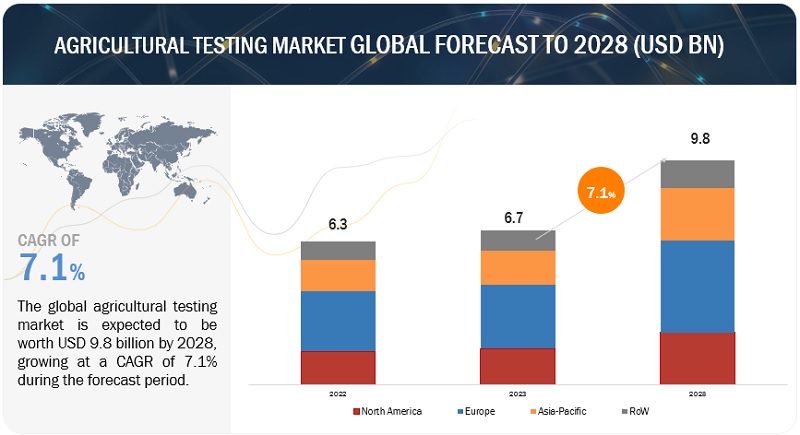Theagricultural testing marketis projected to reach USD 9.8 billion by 2028 from USD 6.7 billion by 2023, at a CAGR of 7.1% during the forecast period in terms of value. The agricultural testing market refers to the industry involved in analyzing various agricultural products, such as soil, water, compost, biosolids, manure and seeds, to determine their quality, composition, and presence of contaminants. This type of testing is crucial for ensuring food safety, optimizing crop production, and maintaining environmental sustainability in the agriculture sector. With the growing global population and rising concerns about foodborne illnesses, there is a greater emphasis on ensuring the safety and quality of agricultural products. Testing helps identifying contaminants, pesticides, heavy metals, and pathogens, enabling proactive measures to be taken to maintain food safety standards. The development of advanced testing methods and technologies has improved the efficiency and accuracy of agricultural testing. These advancements include the use of remote sensing, DNA testing, and rapid diagnostic techniques, which have streamlined the testing process and reduced turnaround times.

Download PDF Brochure:https://www.marketsandmarkets.com/pdfdownloadNew.asp?id=203945812
By sample, water is projected to have the fastest growing rate during the forecast period.
The demand for water testing in the agricultural sector has increased as farmers and regulatory bodies recognize its significance in maintaining productivity, profitability, and sustainability in agricultural practices. Water is a crucial resource for agriculture, especially in irrigation systems. The quality of water used for irrigation can directly impact crop health and productivity. Testing water for parameters such as pH, salinity, nutrient levels, heavy metals, and microbial contaminants helps farmers determine its suitability for irrigation. High-quality water is essential to avoid damaging crops, soil, and irrigation equipment. Additionally, agricultural practices often involve the use of pesticides, herbicides, and other chemicals to control pests, diseases, and weeds. Runoff from fields can contaminate water sources with these residues. Water testing allows farmers to monitor the presence and concentration of such substances, ensuring compliance with regulations and minimizing potential health risks associated with contaminated water supplies.
By application, safety testing is projected to have fastest growing rate during the forecast period.
products are subject to various national and international regulations, standards, and guidelines. Safety testing is necessary to comply with these regulations and ensure that products meet the specified safety criteria. Non-compliance can result in product recalls, legal consequences, damage to reputation, and loss of market access. By conducting safety testing, agricultural businesses can demonstrate their commitment to meeting regulatory requirements and providing safe products to consumers. Also, agricultural products are often traded internationally, and different countries have specific safety standards and import regulations. Exporting agricultural products requires compliance with the safety requirements of the destination market. Safety testing is necessary to ensure that products meet these standards and avoid potential trade barriers or rejections. Exporters must provide evidence of safety testing to demonstrate the suitability of their products for international markets.
Request for Sample Pages:https://www.marketsandmarkets.com/requestsampleNew.asp?id=203945812
Asia Pacific is expected to have the fastest growing rate during the forecast period.
The Asia-Pacific region is home to a significant portion of the global population, including countries like China and India, which have the world's largest populations. This densely populated region requires extensive agricultural production to meet the growing food demand. As a result, there is a greater need for agricultural testing to ensure the safety, quality, and productivity of agricultural products. The Asia-Pacific region has experienced rapid industrialization and urbanization, leading to increased pollution and pressure on agricultural lands. This has raised concerns about the impact of industrial activities and urban expansion on agricultural productivity and safety. Agricultural testing helps identify and mitigate potential contamination risks, ensuring the safety and sustainability of agricultural practices in the face of urban development.
The key players covered in the study include SGS (Switzerland), Eurofins (Luxembourg), Intertek (UK), Bureau Veritas (France), ALS Limited (Australia), TUV Nord Group (Germany), Merieux (US), AsureQuality (New Zealand), RJ Hill Laboratories Limited (New Zealand), SCS Global (US), Agrifood Technology (Australia), APAL Agricultural Laboratory (Australia), Agvise Laboratories (US), LGC Limited (UK) and Water Agricultural Laboratories (US).















